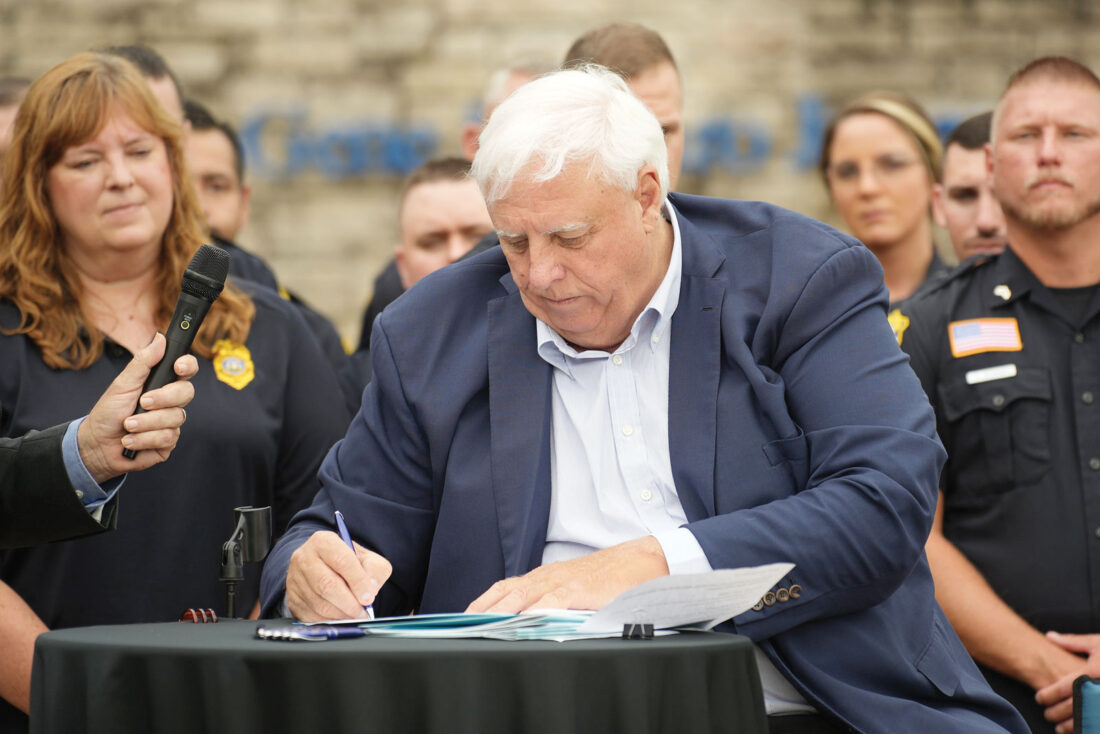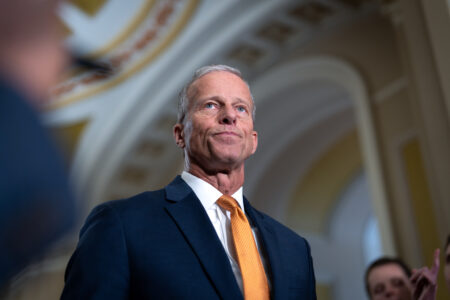Justice tries again to avoid testimony on state corrections lawsuit

Gov. Jim Justice signs bills in August 2023 at the Gene Spadaro Juvenile Center in Fayette County providing pay raises to correctional officers. (Photo Provided)
CHARLESTON — Attorneys for Gov. Jim Justice and Chief of Staff Brian Abraham argue that attempts by attorneys representing inmates in West Virginia’s correctional facilities are inappropriate.
Attorneys for Justice and Abraham filed a renewed motion for a protective order Monday to prevent them from sitting for depositions and asked U.S. District Judge Irene Berger to deny a motion from attorneys representing state inmates to compel written discovery from the Governor’s Office regarding internal decisions regarding funding and staffing of 11 prisons, 10 regional jails, 10 juvenile centers and three work-release sites.
“The extraordinary circumstances necessary to justify forcing the deposition of a high-ranking government official — particularly the governor of a sovereign state — are manifestly not present here,” wrote attorney Michael Hissam representing the Governor’s Office.
“It is difficult to fathom a greater intrusion into the Office of the Governor than a deposition on lawful, discretionary policy decisions — and internal deliberations that occurred in developing the same — which are plainly well-within the state constitutional domain of that high office,” Hissam continued. “Much less are those wholly discretionary funding decisions granted under state constitution the proper subject of intrusive discovery and litigation ordered by federal court decree.”
A class action lawsuit was filed Aug. 8, 2023, in the U.S. District Court for the Southern District of West Virginia against Justice and Department of Homeland Security Cabinet Secretary Mark Sorsaia accusing the state of understaffing, overcrowding and delays of deferred maintenance for facilities. The inmates accuse the state of violating their Eighth Amendment constitutional rights against cruel and unusual punishment.
The inmates are seeking a ruling in their favor and an order to require the state to spend no less than $330 million on staffing and maintenance for the state’s entire correctional system with available funds or by submitting appropriations bills.
Both Sorsaia, whose department oversees the Division of Corrections and Rehabilitation (DCR), and Justice filed motions at the end of 2023 seeking dismissal of the federal lawsuit. Attorneys for the state argue that the legal remedy being sought by the inmates violates the state’s sovereign immunity and separation of powers between the state and federal government.
West Virginia had been under a state of emergency for nearly two years beginning in August 2022 because of severe understaffing of jails and prisons, with members of the West Virginia National Guard and even the Division of Natural Resources helping to fill vacancies. More than 731 guard members provided staffing over the last 21 months, with the highest number at one time being 422. According to the Governor’s Office, 38 guard members have accepted full-time employment in DCR.
Following a special session last summer, Justice signed six corrections bills, including a bill providing $21.1 million to increase the starting pay and change pay scales for correctional officers; and two other bills providing nearly $6 million for one-time bonuses for support staff in the correctional system.
In a press release on May 24, Justice announced the end of the second state emergency for corrections – the first state of emergency been issued at the end of 2017. Since January, DCR has seen 238 new correctional officers graduate from its academy, and another 47 cadets began training in May.
Attorneys for the inmates are seeking documents and seeking to question Justice and Abraham regarding the decision process on funding proposals for DCR in the annual budget bill setting the general revenue budget for the state each fiscal year, why there were no special sessions calls to address funding and staffing issues for corrections, the nature of internal discussions between the governor’s office and department heads about corrections issues, the how public policy was developed during Justice’s nearly eight years in office.
“(The inmates) are not entitled to take the deposition of the Governor or COS Abraham – much less on topics that go to the heart of the Governor’s discretionary and lawful exercise of core state constitutional prerogatives and policymaking,” Hissam wrote.
“Plaintiffs have not explained why the Governor’s or COS Abraham’s depositions are necessary or essential for proving up their claim that unconstitutional conditions exist in West Virginia’s correctional institutions,” Hissam continued. “It is difficult to see how the Governor’s or COS Abraham’s testimony on the discretionary spending decisions endowed to the Governor under the state constitution (and not otherwise violative of any federal law) would be relevant to the claim, even if he was a proper party.”






